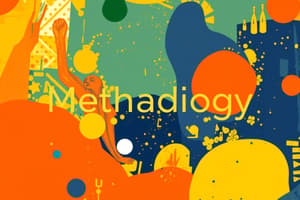Podcast
Questions and Answers
What is the primary aim of basic research?
What is the primary aim of basic research?
- To gain comprehensive knowledge without immediate application (correct)
- To establish a marketing strategy
- To prepare a statistical analysis
- To solve specific practical problems (correct)
Which of the following is NOT a phase in the research process?
Which of the following is NOT a phase in the research process?
- Literature Review
- Conclusion and Reporting
- Hypothesis Testing (correct)
- Data Collection
What is random sampling?
What is random sampling?
- Grouping the population and sampling each group
- Sampling based on availability
- Each member has an equal chance of selection (correct)
- Selecting participants based on specific characteristics
Which type of validity relates to the generalizability of study findings?
Which type of validity relates to the generalizability of study findings?
What is the focus of applied research?
What is the focus of applied research?
Which data collection method is characterized by direct engagement with participants?
Which data collection method is characterized by direct engagement with participants?
What are delimitations in a research study?
What are delimitations in a research study?
What is an important ethical consideration in research?
What is an important ethical consideration in research?
Flashcards are hidden until you start studying
Study Notes
Research
- Definition: Systematic investigation to establish facts, principles, or generalizable knowledge.
- Types:
- Basic Research: Aimed at gaining more comprehensive knowledge without immediate application.
- Applied Research: Focused on solving specific, practical problems.
- Phases:
- Problem Identification
- Literature Review
- Hypothesis Formulation
- Research Design
- Data Collection
- Data Analysis
- Conclusion and Reporting
Methodology
- Definition: A framework that outlines the processes, techniques, and strategies used in research.
- Components:
- Research Design: Overall strategy to integrate different components of the study in a coherent manner.
- Types:
- Descriptive
- Correlational
- Experimental
- Qualitative
- Quantitative
- Types:
- Sampling:
- Random Sampling: Each member has an equal chance of selection.
- Stratified Sampling: Divides population into subgroups and samples from each.
- Convenience Sampling: Based on availability and willingness to participate.
- Data Collection Methods:
- Surveys and Questionnaires
- Interviews (Structured, Semi-structured, Unstructured)
- Observations
- Document Analysis
- Data Analysis Techniques:
- Statistical Analysis (Descriptive & Inferential)
- Thematic Analysis (for qualitative data)
- Content Analysis
- Research Design: Overall strategy to integrate different components of the study in a coherent manner.
Ethical Considerations
- Informed Consent: Participants must agree to participate with full understanding of the study.
- Confidentiality: Safeguarding personal data and identities of participants.
- Avoiding Harm: Minimizing physical, psychological, and emotional risks.
Validity and Reliability
- Validity: The accuracy of the research results; it answers whether the study measures what it intends to measure.
- Types:
- Internal Validity: Confidence that the results are due to the independent variable.
- External Validity: Generalizability of the findings to other contexts.
- Types:
- Reliability: Consistency of the research findings across different studies or instruments.
Limitations and Delimitations
- Limitations: Potential weaknesses in the study design or methodology that may impact findings.
- Delimitations: Boundaries set by the researcher to narrow the scope of the study.
Reporting Results
- Present findings clearly and concisely.
- Use visuals (graphs, tables) where applicable.
- Discuss implications, limitations, and future research directions.
Research
- Systematic investigation to establish facts, principles, or generalizable knowledge.
- Basic research expands knowledge without immediate application.
- Applied research focuses on solving practical problems.
- Research phases: problem identification, literature review, hypothesis formulation, research design, data collection, data analysis, conclusion and reporting.
Methodology
- A framework outlining research processes, techniques, and strategies.
- Research design integrates study components. Types include descriptive, correlational, experimental, qualitative, and quantitative.
- Sampling methods: random (equal chance of selection), stratified (sampling from subgroups), convenience (based on availability).
- Data collection methods: surveys, interviews (structured, semi-structured, unstructured), observations, document analysis.
- Data analysis techniques: statistical analysis (descriptive and inferential), thematic analysis (qualitative), content analysis.
Ethical Considerations
- Informed consent is crucial: participants must understand the study before agreeing to participate.
- Confidentiality protects participant data and identities.
- Research must minimize physical, psychological, and emotional harm to participants.
Validity and Reliability
- Validity: accuracy of research results; does the study measure what it intends?
- Internal validity: confidence that results are due to the independent variable.
- External validity: generalizability of findings to other contexts.
- Reliability: consistency of findings across different studies or instruments.
Limitations and Delimitations
- Limitations: potential weaknesses impacting findings.
- Delimitations: researcher-defined boundaries narrowing the study's scope.
Reporting Results
- Present findings clearly and concisely, using visuals (graphs, tables) when appropriate.
- Discuss implications, limitations, and future research directions.
Studying That Suits You
Use AI to generate personalized quizzes and flashcards to suit your learning preferences.




